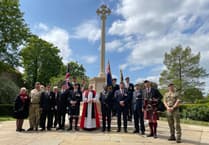“Invasion Day has come, and June 6th, 1944, will live in history as a great day. It marks the beginning of the tremendous effort to free Europe and the world from Nazi and Fascist tyranny and cruelty,” the Herald announced in its edition of June 10, 1944, four days after the greatest seaborne invasion in human history.
It continued: “The Allied forces landed on the coast of France, on the beaches of Normandy, whence came our William the Conqueror, in the early hours of the day. The landing was not made without loss, but the loss was not nearly as much as was predicted by some gloomy pessimists. Their ‘fears were liars’.
“Nor has our invasion been followed up by an airborne invasion of this country by the enemy, as other even more gloomy pessimists thought would be the case; their fears are greater liars still.
“As we write, on the morning of June 8, our beacheads have been freed from the enemy and we have taken the small town of Bayeux, and are continuously landing reinforcements, munitions and stores by sea and air. The weather has been none too kind to us, but we have succeeded in spite of this and many other drawbacks.
“The planes almost ceaselessly roar or rumble overhead, reminding all of the well-established fact that we have overwhelming air superiority, and it has been said with much truth, that the side which is triumphant in the air must in the long run be triumphant on the sea and land.
“This being so we can be quietly confident. The great battle has not yet been won; it has barely been begun, but we can all look forward with the greatest hope, commending our cause, as our King bids us do, to God, Who blesses the righteous cause and can alone give victory.”
But in other news that week, six boys aged 13 to 15 almost met an explosive end before the landings, after raiding a stash of ammunition, hand grenades and high explosive bombs from the 2nd Surrey Home Guard stores in Seale.
Farnham Juvenile Court heard the boys removed the hinges of a door with a screwdriver, then “made fires and exploded certain ammunition which went off ‘with a bang’.”
Chairman of the bench, Mr HM Phillipson-Stow, told the boys they were “lucky to be alive”, and dished out fines ranging from 10s up to £3 17s 6d.
There was also news of repatriations of prisoners of war Corporal Albert James Jones from Tongham, and Bandsman James Hartley of the Cameron Highlanders, from Badshot Lea, the latter having been captured before the Dunkirk evacuation on May 26, 1940.
Lieutenant Michael FR Ainslie, DSC RN, commander of a British submarine, was decorated with the Legion of Merit for “exceptionally meritorious conduct in the performance of outstanding services to the Government of the United States as Commanding Officer of a British submarine during the assault on the island of Sicily”.
And MSS Edwin Lunn, formerly of The Barley Mow in The Sands, was mentioned in dispatches for “gallant and distinguished service in the Middle East”.
Less happy news arrived with the reported deaths of Captain Geoffrey Sloan, from Bentley, killed fighting with the East Surrey Regiment in Italy, aged 24, and Lieutenant Archibald Buckle, who was “well known and loved by many friends in Farnham” and was killed in action in the Far East.
The Regal Cinema in East Street, Farnham, showed Jane Eyre starring Joan Fontaine, Orsen Welles and John Sutton.
And tying the knot were Miss Emily Lena Olive Swann, serving with the ATS, of Weydon Hill Road, Farnham, and Sqd Sgt Major Louis Frederick Barrett, RAC, of the Shepherd and Flock, Guildford Road, Farnham.
The couple were married at the church of St Thomas-on-The Bourne, the bride wearing a gown of ivory satin with ivory head-dress and veil, and carried a sheaf of pale blue and pink lupins.


_-004.jpeg?width=209&height=140&crop=209:145,smart&quality=75)


Comments
This article has no comments yet. Be the first to leave a comment.